@TerryP an in depth article on North Charleston's police chief:
In Diverse North Charleston, Where Most Police are White, a Black Chief Tries to Bridge the Divide
As recruiting Black officers proves challenging, Chief Reggie Burgess focuses on building ties in communities to address long-standing tensions
By Dan Frosch and Talal Ansari| Photographs by Lynsey Weatherspoon for The Wall Street Journal
July 3, 2020 8:00 am ET
NORTH CHARLESTON, S.C.—Police Chief Reggie Burgess was in church one Sunday in February when his phone started buzzing. A young Black man had died after a standoff with several white officers. Rumors were flying that police had shot him, and upset community members wanted answers.
It was a tense moment, particularly in a city with a population that is 46% Black and a police force that is nearly 75% white. Relations between the department and the Black community have long been fraught, and reached a low point when an unarmed Black man, Walter Scott, was shot in the back by a white officer five years ago, an incident caught on video that sparked a national uproar. The officer was fired, pleaded guilty to civil-rights violations, and was sentenced to 20 years in prison.
Chief Burgess, the first African-American to lead the North Charleston police, stayed on his phone as he left church, asking one activist he had known for years to hold off issuing any statements criticizing the department until he got more information. At the scene, the chief examined security camera footage that showed the distraught man shooting himself in the head.
Having experienced racism himself while growing up in this southern city, he knew the burden was on him to show his officers had done nothing wrong. After praying with the deceased man’s father, he told the activist that he could watch the video after the family.
“I’ve been Black all my life…I understand why people sometimes assume the worst,” said Chief Burgess, who has a lean, athletic build and speaks in a booming baritone voice.
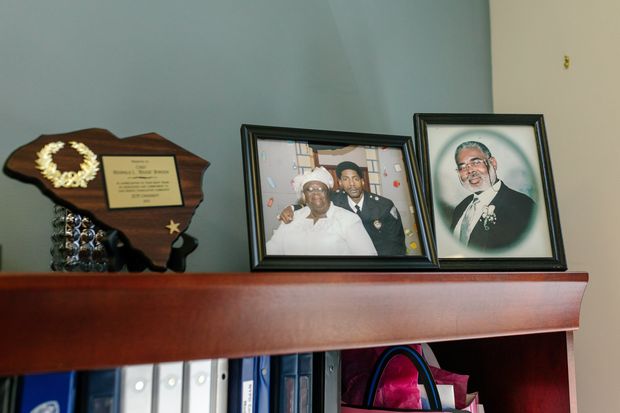
Personal photos and awards decorate the office of Chief Burgess.
Like others in his position across the country, Chief Burgess has sought to diversify his department so it better reflects his city. Images of largely white police forces facing off with Black Lives Matter protesters in cities like Ferguson, Mo., six years ago drew nationwide calls for change, and the recent wave of protests spurred by the police killing of George Floyd has intensified that pressure.
Attracting young Black people to join the ranks isn’t easy, Chief Burgess said, when policing often isn’t a profession family and friends encourage them to pursue. He has searched for potential recruits at historically Black colleges, technical colleges and in the military, as well as in the North Charleston neighborhoods from which he hails. Of the 109 officers he has hired in the past two years, 38 are Black men and women.
Despite Republicans and Democrats both being keen to pass some form of police reform legislation, they are yet to come to an agreement. WSJ’s Gerald F. Seib explains why the political climate is weighing on the chances they will come together. Photo: Jonathan Ernst/Reuters
“I can go to all the Black churches in this city, cookouts, family gatherings. But I’ll never be able to get 360 people that are African-American to work here,” Chief Burgess said, referring to his department’s total size. “So what I’m trying to get is the right person. The person who believes that when I go to that house, those folks are calling me for a reason.”
Among North Charleston’s latest class of recruits is Bre’Onna Searles, a 23-year-old Black cadet who said she wanted to bridge the mistrust her community has for police. The recent protests against police made her want to finish her training sooner, she said.
“I don’t want people to feel like they have to be afraid of us. I’m an African-American woman and I wear a badge, and I’m not a bad cop. I just want to be able to show that,” she said.
Criminal justice specialists say diversifying departments doesn’t necessarily bring change. According to a 2017 Indiana University study, adding small numbers of Black officers had no effect on the number of police shootings of Black citizens.
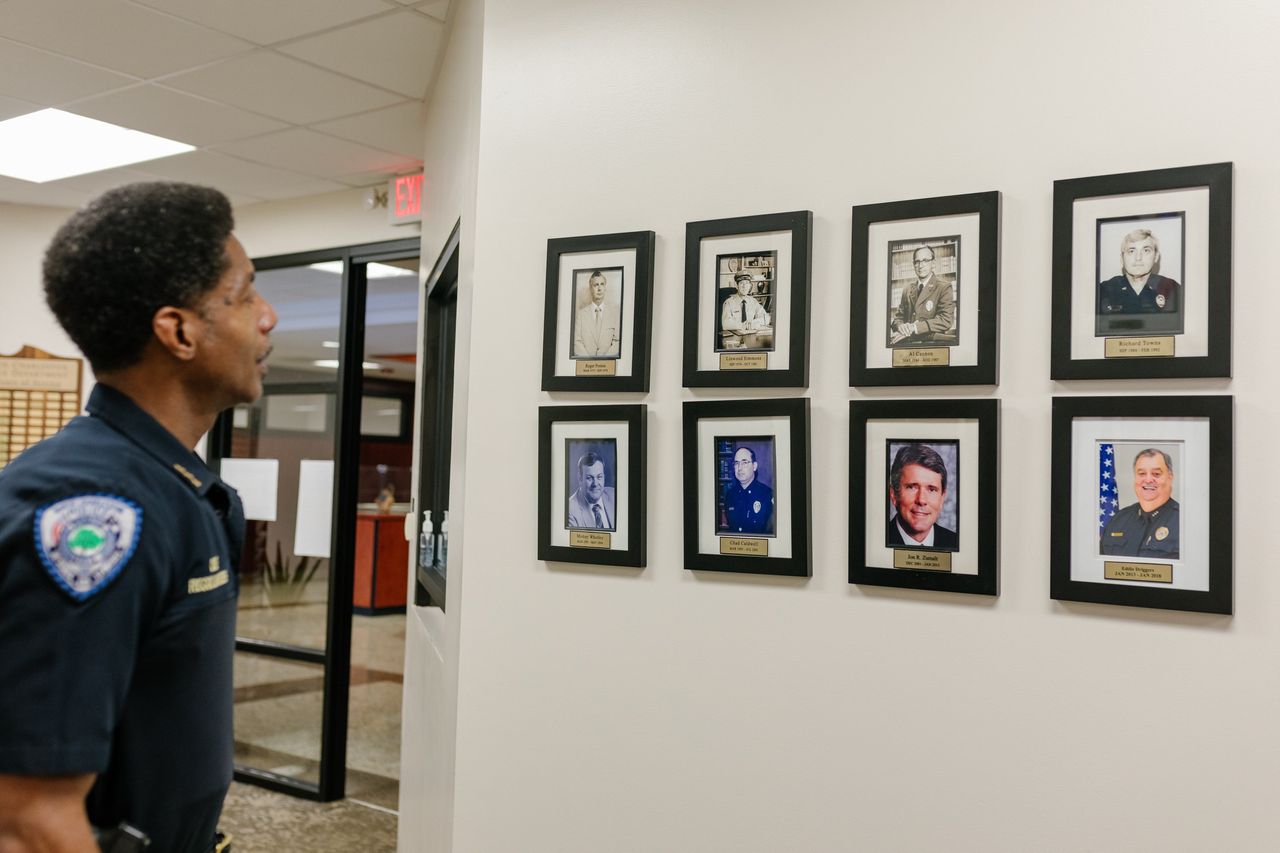
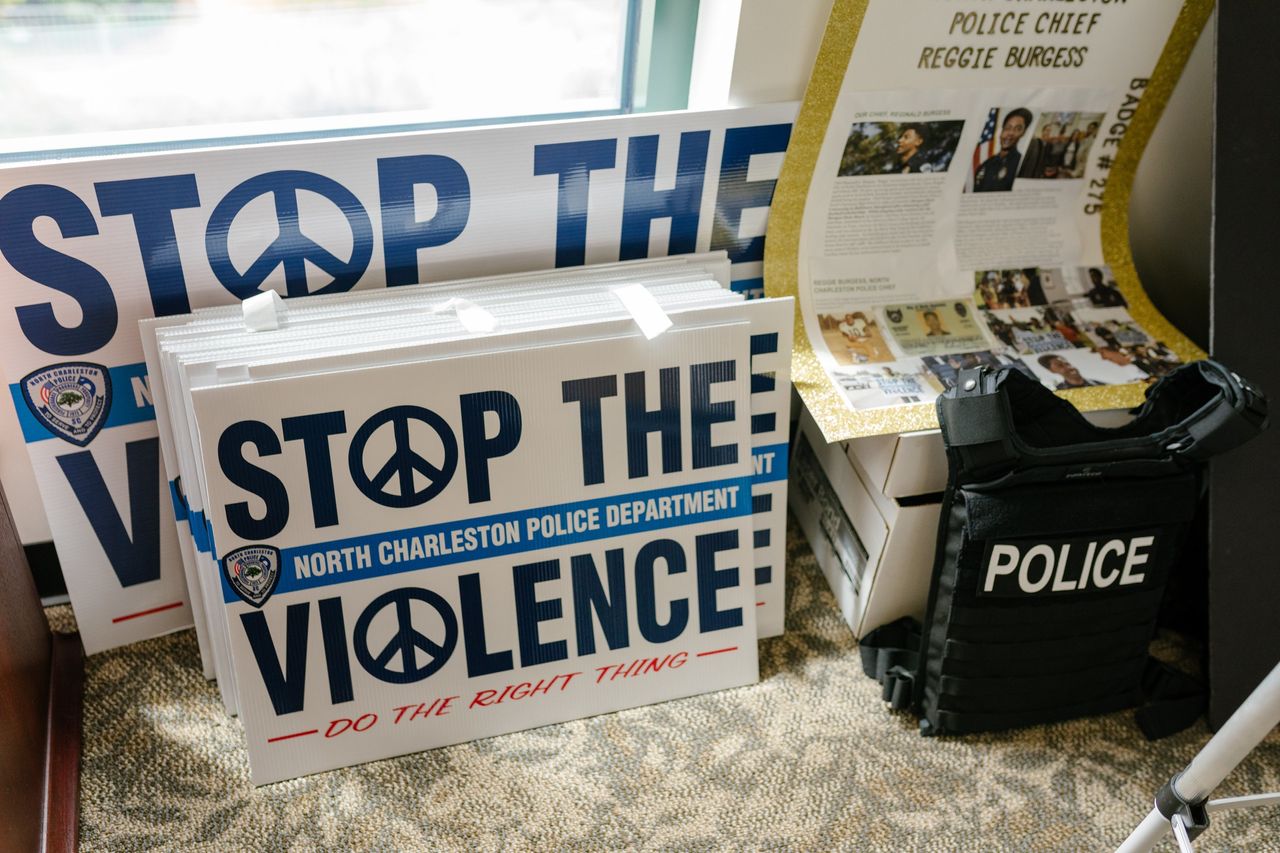
Chief Burgess looking at portraits of former North Charleston police chiefs on the wall of City Hall. He keeps signs in his office for his 'Stop the Violence' walks.
Rashawn Ray, a University of Maryland sociology professor, said that an officer’s connection to the community can be the most pivotal factor in shifting a department’s culture.
“It’s not simply about being Black. It’s also about being from a particular neighborhood, which might happen to be predominantly Black,” he said.
A forthcoming study by Stephen Wu, a professor of economics at Hamilton College, found that the per capita rate of fatal shootings by police was about 65% higher in cities with white chiefs than in cities with Black chiefs. The study used data from the 60 largest U.S. cities between 2015 and 2020.
Chief Burgess, 55 years old, a former college All-American wide receiver whose dreams of going pro fizzled, joined the force in 1989 and served as a school resource officer, detective and SWAT commander before being named to his current post in 2018. At the time, North Charleston, a city of 115,000, was in trouble.
Many were still angry over the shooting of Mr. Scott and years of aggressive policing in the Black community. In 2017, the NAACP Legal Defense and Educational Fund released a report that found Black residents filed a disproportionate share of complaints against North Charleston police compared with white residents, but were less likely to have theirs found credible. The Justice Department, under the Obama administration, launched an assessment of the department’s policies, but the review was abandoned by the Trump administration.
“You had people that wanted to explode,” said Chief Burgess.
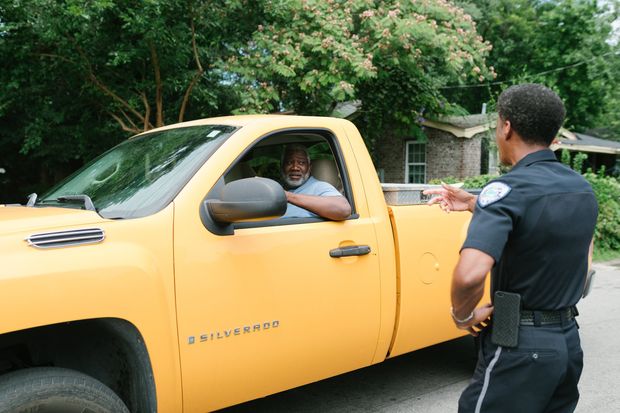
Chief Burgess stopping to chat with Clifford Brown while on shift in North Charleston.
He told his officers he wanted to replace sweeps of Black neighborhoods searching for criminals with more targeted operations. He had officers trained at the YWCA’s Racial Equality Institute and sent them to civic club meetings, urging them to build personal relationships with Black residents. He recalled that, as a patrol officer, he would stop to lift weights or converse with young men in front yards, wanting to show them they could coexist with police peacefully.
“It cannot be us against them,” he said. “The ‘them’ is the people we’re serving.
Still, Chief Burgess has vowed his department wouldn’t pull back on enforcement, stating emphatically that the majority of the city’s homicide victims are Black and the perpetrators are too often “my people.”
Every time a community member is murdered, the chief, whose nephew was gunned down in North Charleston several years ago, walks the neighborhood holding a “Stop the Violence” sign.
Homicides dropped to 25 during his first year as chief compared with 36 in 2017. There were 26 murders last year, and so far there have been 13 in 2020.
“What has changed is having a Black chief who came up in the community,” said James Johnson, a longtime North Charleston activist. “The community is still skeptical of the police department, the wounds are still there. But they believe Reggie is truthful and honest.”
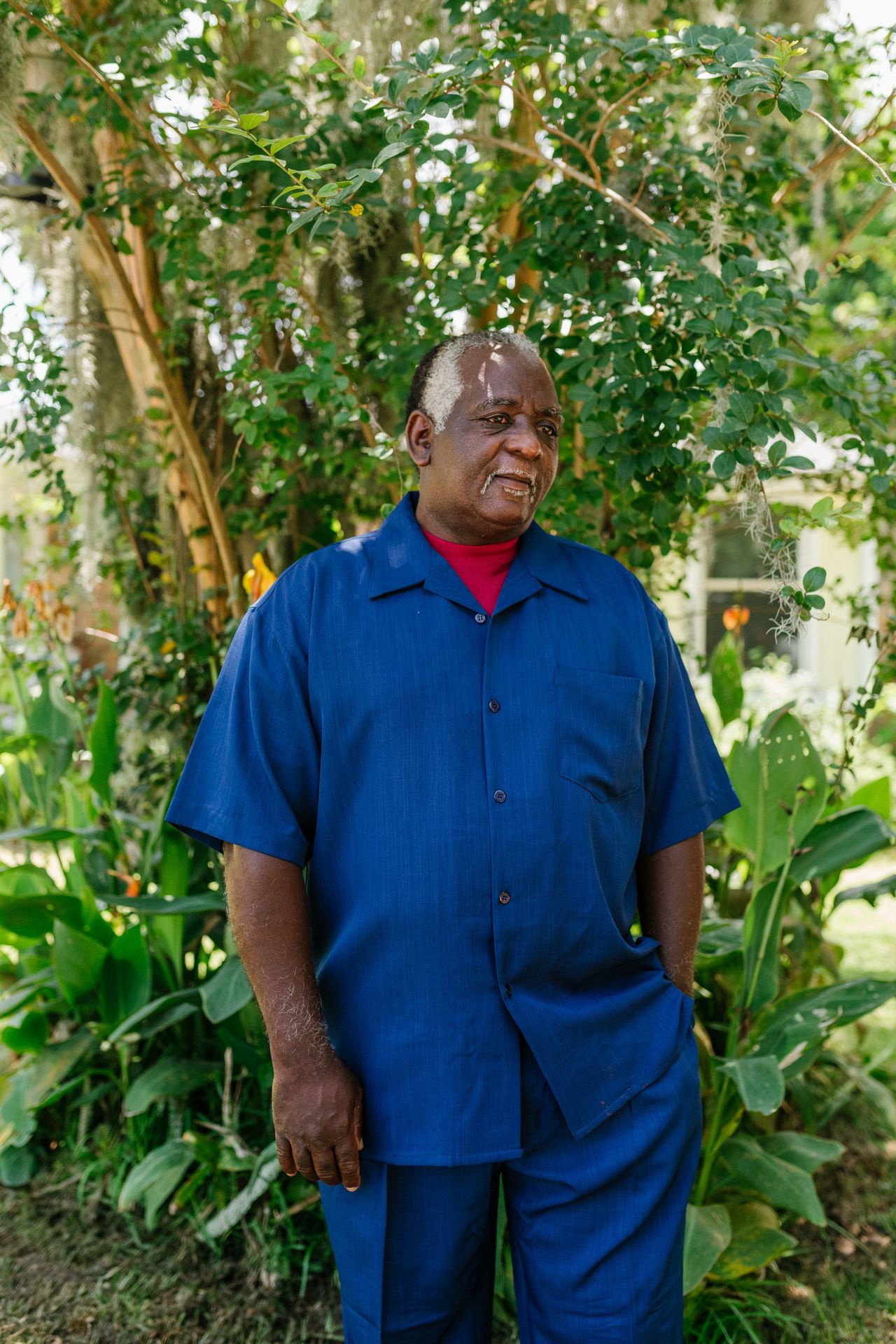
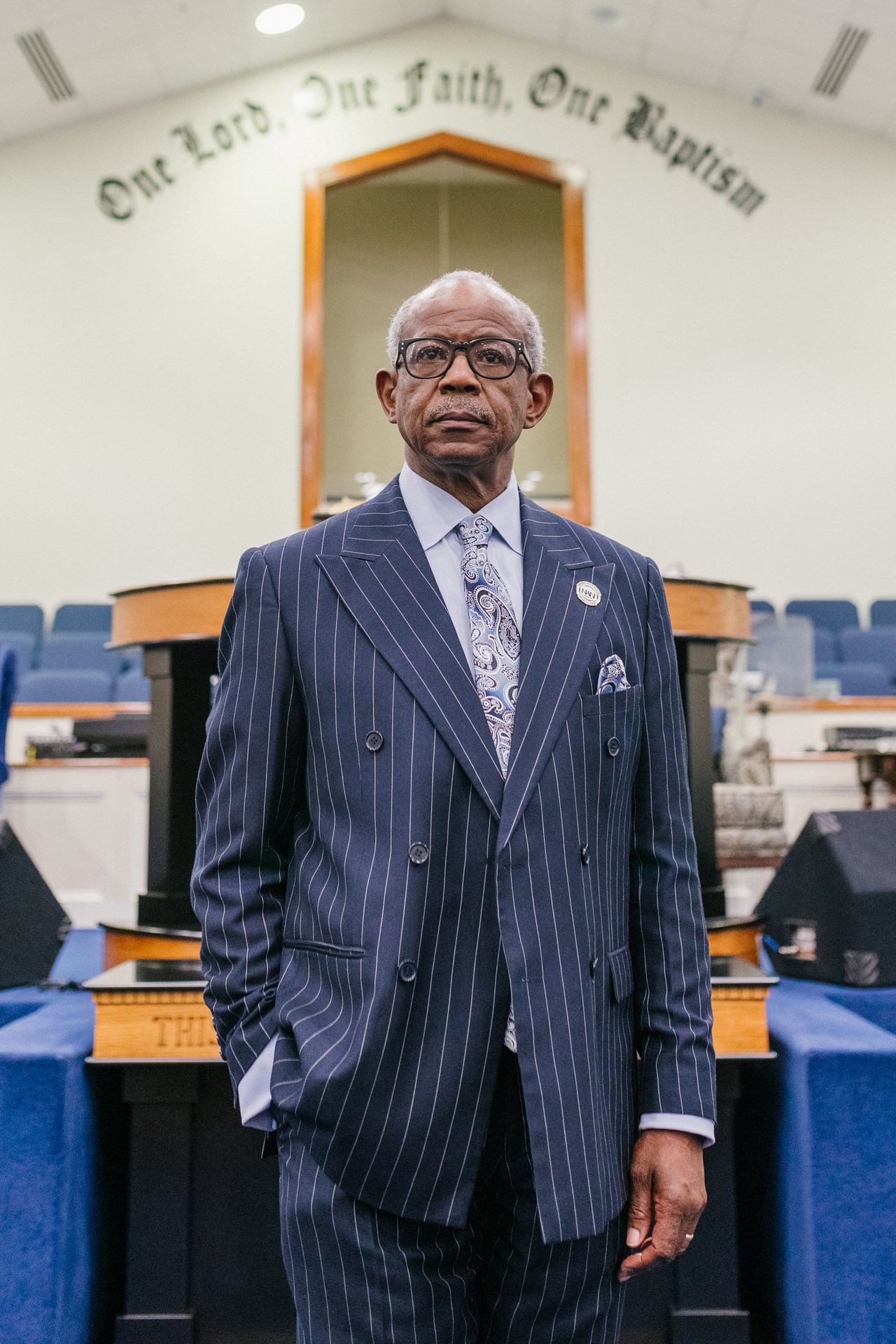
James Johnson, a longtime North Charleston activist, and Rev. Nelson Rivers III, a prominent North Charleston pastor.
In May, community activists accused the department of racial profiling and excessive force in multiple encounters with a 21-year-old Black man who is the grandson of a former Charleston city councilman. Video footage showed him being slammed into a wall after being detained by several North Charleston police officers.
Chief Burgess said that his officers weren’t racial profiling and detailed each encounter publicly, noting that a shotgun was found in the man’s car. Several officers are being disciplined for their conduct in the incident, he said.
Community members have also criticized police and city officials for being slow to agree to a racial-bias audit of the department, which the NAACP and a citizen advisory committee requested several years ago. Chief Burgess said he had initially favored waiting until he evaluated his department’s policies. But he has since gotten behind the audit, and the city council recently voted to move forward with the review.
“I told him: You have a chance to serve as chief long enough to see the audit through,” said Rev. Nelson Rivers III, a prominent North Charleston pastor. “Otherwise, things will not have changed appreciably, and your legacy will be you were just a Black chief.”
On a recent day, the chief drove through the same North Charleston neighborhoods where he grew up, not far from where Mr. Scott was killed in a leafy park off one of the city’s main drags. Chief Burgess said he thinks often about the potential for a similar incident. He hopes the work he and others are doing will help get North Charleston through it should that day come.
“You can’t expect to overcome a crisis and…get relationships when that crisis is going on,” Chief Burgess said. “You have to develop those relationships before the crisis comes.”
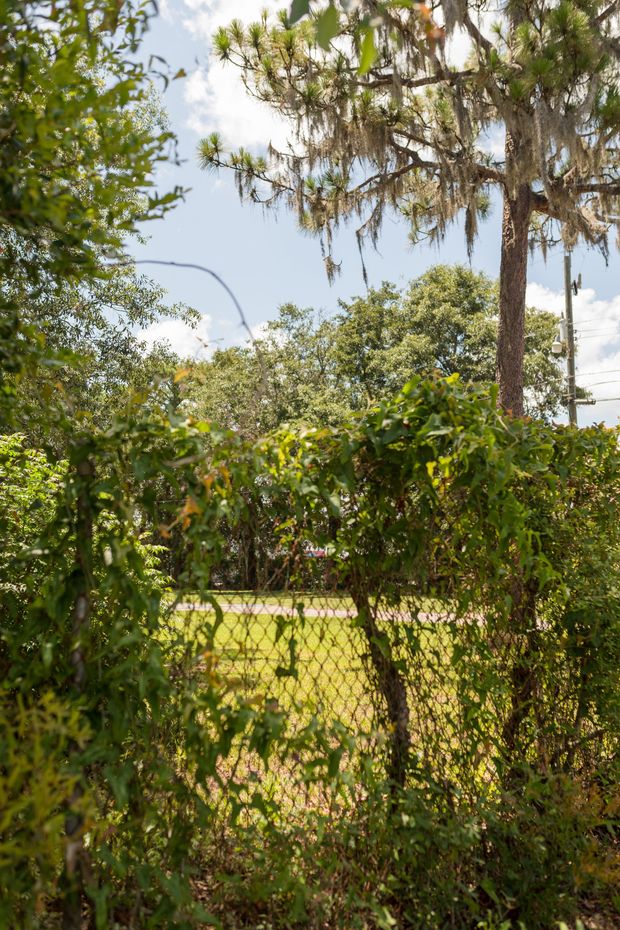
The lot where Walter Scott was killed by officer Michael Slager in 2015.
Write to Dan Frosch at dan.frosch@wsj.com and Talal Ansari at Talal.Ansari@wsj.com
In Diverse North Charleston, Where Most Police are White, a Black Chief Tries to Bridge the Divide
As recruiting Black officers proves challenging, Chief Reggie Burgess focuses on building ties in communities to address long-standing tensions
By Dan Frosch and Talal Ansari| Photographs by Lynsey Weatherspoon for The Wall Street Journal
July 3, 2020 8:00 am ET
NORTH CHARLESTON, S.C.—Police Chief Reggie Burgess was in church one Sunday in February when his phone started buzzing. A young Black man had died after a standoff with several white officers. Rumors were flying that police had shot him, and upset community members wanted answers.
It was a tense moment, particularly in a city with a population that is 46% Black and a police force that is nearly 75% white. Relations between the department and the Black community have long been fraught, and reached a low point when an unarmed Black man, Walter Scott, was shot in the back by a white officer five years ago, an incident caught on video that sparked a national uproar. The officer was fired, pleaded guilty to civil-rights violations, and was sentenced to 20 years in prison.
Chief Burgess, the first African-American to lead the North Charleston police, stayed on his phone as he left church, asking one activist he had known for years to hold off issuing any statements criticizing the department until he got more information. At the scene, the chief examined security camera footage that showed the distraught man shooting himself in the head.
Having experienced racism himself while growing up in this southern city, he knew the burden was on him to show his officers had done nothing wrong. After praying with the deceased man’s father, he told the activist that he could watch the video after the family.
“I’ve been Black all my life…I understand why people sometimes assume the worst,” said Chief Burgess, who has a lean, athletic build and speaks in a booming baritone voice.
Personal photos and awards decorate the office of Chief Burgess.
Like others in his position across the country, Chief Burgess has sought to diversify his department so it better reflects his city. Images of largely white police forces facing off with Black Lives Matter protesters in cities like Ferguson, Mo., six years ago drew nationwide calls for change, and the recent wave of protests spurred by the police killing of George Floyd has intensified that pressure.
Attracting young Black people to join the ranks isn’t easy, Chief Burgess said, when policing often isn’t a profession family and friends encourage them to pursue. He has searched for potential recruits at historically Black colleges, technical colleges and in the military, as well as in the North Charleston neighborhoods from which he hails. Of the 109 officers he has hired in the past two years, 38 are Black men and women.
Despite Republicans and Democrats both being keen to pass some form of police reform legislation, they are yet to come to an agreement. WSJ’s Gerald F. Seib explains why the political climate is weighing on the chances they will come together. Photo: Jonathan Ernst/Reuters
“I can go to all the Black churches in this city, cookouts, family gatherings. But I’ll never be able to get 360 people that are African-American to work here,” Chief Burgess said, referring to his department’s total size. “So what I’m trying to get is the right person. The person who believes that when I go to that house, those folks are calling me for a reason.”
Among North Charleston’s latest class of recruits is Bre’Onna Searles, a 23-year-old Black cadet who said she wanted to bridge the mistrust her community has for police. The recent protests against police made her want to finish her training sooner, she said.
“I don’t want people to feel like they have to be afraid of us. I’m an African-American woman and I wear a badge, and I’m not a bad cop. I just want to be able to show that,” she said.
Criminal justice specialists say diversifying departments doesn’t necessarily bring change. According to a 2017 Indiana University study, adding small numbers of Black officers had no effect on the number of police shootings of Black citizens.
Chief Burgess looking at portraits of former North Charleston police chiefs on the wall of City Hall. He keeps signs in his office for his 'Stop the Violence' walks.
Rashawn Ray, a University of Maryland sociology professor, said that an officer’s connection to the community can be the most pivotal factor in shifting a department’s culture.
“It’s not simply about being Black. It’s also about being from a particular neighborhood, which might happen to be predominantly Black,” he said.
A forthcoming study by Stephen Wu, a professor of economics at Hamilton College, found that the per capita rate of fatal shootings by police was about 65% higher in cities with white chiefs than in cities with Black chiefs. The study used data from the 60 largest U.S. cities between 2015 and 2020.
Chief Burgess, 55 years old, a former college All-American wide receiver whose dreams of going pro fizzled, joined the force in 1989 and served as a school resource officer, detective and SWAT commander before being named to his current post in 2018. At the time, North Charleston, a city of 115,000, was in trouble.
Many were still angry over the shooting of Mr. Scott and years of aggressive policing in the Black community. In 2017, the NAACP Legal Defense and Educational Fund released a report that found Black residents filed a disproportionate share of complaints against North Charleston police compared with white residents, but were less likely to have theirs found credible. The Justice Department, under the Obama administration, launched an assessment of the department’s policies, but the review was abandoned by the Trump administration.
“You had people that wanted to explode,” said Chief Burgess.
Chief Burgess stopping to chat with Clifford Brown while on shift in North Charleston.
He told his officers he wanted to replace sweeps of Black neighborhoods searching for criminals with more targeted operations. He had officers trained at the YWCA’s Racial Equality Institute and sent them to civic club meetings, urging them to build personal relationships with Black residents. He recalled that, as a patrol officer, he would stop to lift weights or converse with young men in front yards, wanting to show them they could coexist with police peacefully.
“It cannot be us against them,” he said. “The ‘them’ is the people we’re serving.
Still, Chief Burgess has vowed his department wouldn’t pull back on enforcement, stating emphatically that the majority of the city’s homicide victims are Black and the perpetrators are too often “my people.”
Every time a community member is murdered, the chief, whose nephew was gunned down in North Charleston several years ago, walks the neighborhood holding a “Stop the Violence” sign.
Homicides dropped to 25 during his first year as chief compared with 36 in 2017. There were 26 murders last year, and so far there have been 13 in 2020.
“What has changed is having a Black chief who came up in the community,” said James Johnson, a longtime North Charleston activist. “The community is still skeptical of the police department, the wounds are still there. But they believe Reggie is truthful and honest.”
James Johnson, a longtime North Charleston activist, and Rev. Nelson Rivers III, a prominent North Charleston pastor.
In May, community activists accused the department of racial profiling and excessive force in multiple encounters with a 21-year-old Black man who is the grandson of a former Charleston city councilman. Video footage showed him being slammed into a wall after being detained by several North Charleston police officers.
Chief Burgess said that his officers weren’t racial profiling and detailed each encounter publicly, noting that a shotgun was found in the man’s car. Several officers are being disciplined for their conduct in the incident, he said.
Community members have also criticized police and city officials for being slow to agree to a racial-bias audit of the department, which the NAACP and a citizen advisory committee requested several years ago. Chief Burgess said he had initially favored waiting until he evaluated his department’s policies. But he has since gotten behind the audit, and the city council recently voted to move forward with the review.
“I told him: You have a chance to serve as chief long enough to see the audit through,” said Rev. Nelson Rivers III, a prominent North Charleston pastor. “Otherwise, things will not have changed appreciably, and your legacy will be you were just a Black chief.”
On a recent day, the chief drove through the same North Charleston neighborhoods where he grew up, not far from where Mr. Scott was killed in a leafy park off one of the city’s main drags. Chief Burgess said he thinks often about the potential for a similar incident. He hopes the work he and others are doing will help get North Charleston through it should that day come.
“You can’t expect to overcome a crisis and…get relationships when that crisis is going on,” Chief Burgess said. “You have to develop those relationships before the crisis comes.”
The lot where Walter Scott was killed by officer Michael Slager in 2015.
Write to Dan Frosch at dan.frosch@wsj.com and Talal Ansari at Talal.Ansari@wsj.com

